#I was so excited that I think I entered a fugue state and just powered this fully colored comic??? idk what happened I blacked out
Explore tagged Tumblr posts
Note
Hiiiiii, is there anything you can tell us about Nini’s doll and its significance? (Apologies if you’ve already answered similar questions)
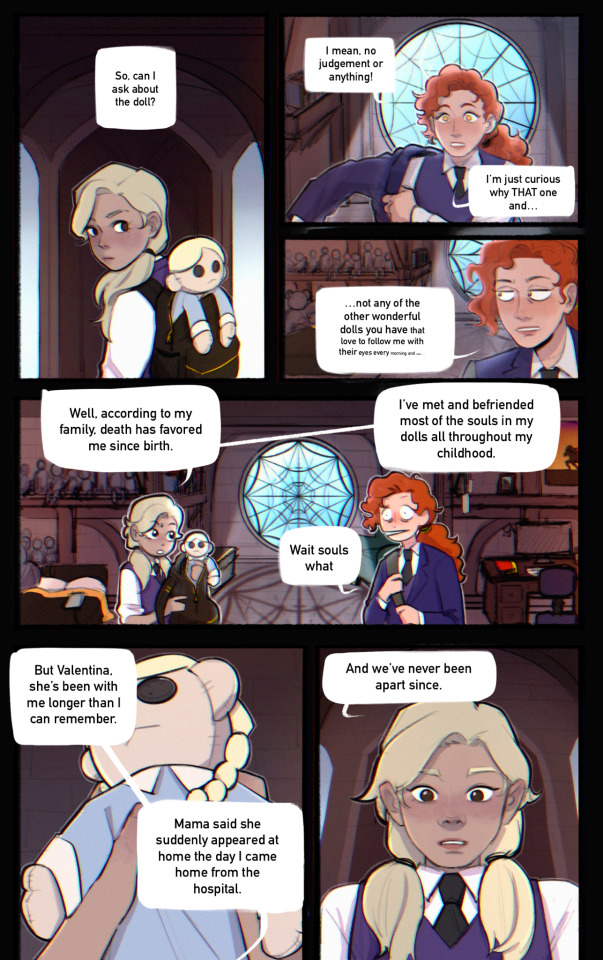
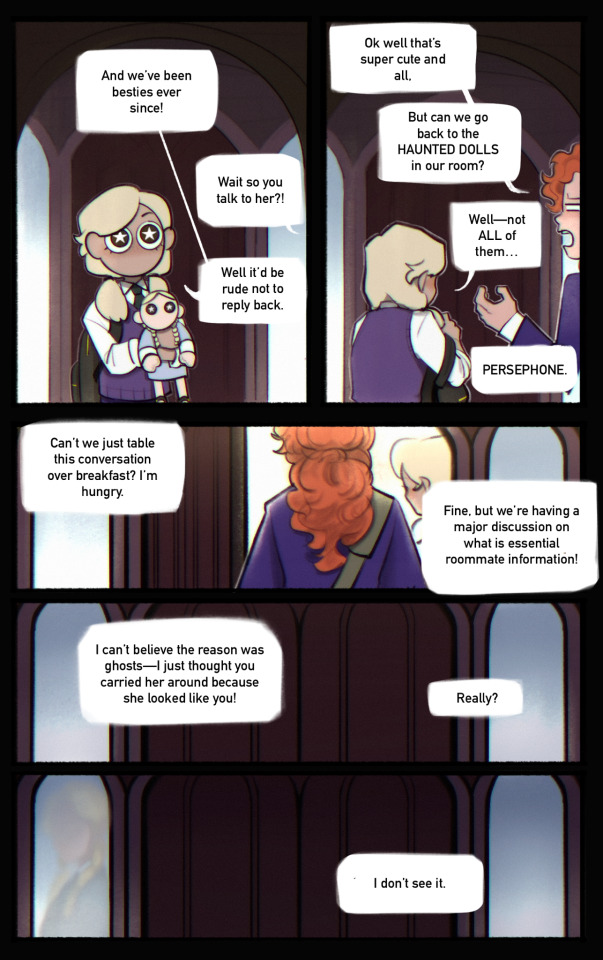
The doll is named Valentina, and she's Nini's best friend! Funny, they kinda look alike huh?
#I am SOOOOOO glad you asked this specific question!!!#I was so excited that I think I entered a fugue state and just powered this fully colored comic??? idk what happened I blacked out#anyways please look carefully at the last panel and the implications 👀#the less enigmatic explanation: Goody Addams is definitely somewhere in the vicinity#introducing (again) the roommate Bryony! she’s a junior who ends up being Nini’s Watson and big sister figure#shift1s#asks#my art#wenclair kids#Persephone Addams#Bryony Godwin#Goody Addams
368 notes
·
View notes
Text
What I really love so much about Pizza Tower is that the game gives you every possible tool and opportunity to go absolutely fucking ham on it. It's an astronomically high skill ceiling and the way scoring, progression, and the game's challenges work is that they're encouraging you to master each level, encouraging you to keep trying until you get the "perfect run": no hits, all treasures, fast time. I'm sure such a thing is exhilarating but that's also a bit beyond what I feel comfortable investing into the game lmao. However, and this is the thing I love, Pizza Tower lets me progress through the game just fine even if I'm not perfecting every single level. There's very little actual punishment in the game, so you can take as much time as you want through the (gorgeous! expansive! deep! complex!) levels as if Peppino's on a leisurely stroll and just look for secrets and treasures that way. The end-of-level escape sequences are a time crunch, yeah, but they are profoundly generous: so generous that the game has a built-in mechanic for letting real deal speedsters take a whole second lap if they want. And, of course, the more you poke around the game at your own pace, the more you might dabble in going ham whenever the urge strikes, whenever you think there's a line you might be able to hit. And you know what else? Floundering and fucking up the speed is all part of the charm. The way that Peppino flops and splats like a doofus whenever you fuck up a movement tech is so funny, and so barely an actual obstacle, and the sheer amount of moves at Peppino's disposal is so tricky to get an exact handle on, that this game will make you feel like an anxiety-fueled indestructible Italian chef schmooving at Mach 5 through bricks, boulders, and bad guys, picking them up and corkscrew piledriving them into each other, screaming the entire time, clambering up the walls like a rat. There's a designated button for striking a pose and if you have pizza toppings following you then the toppings strike a pose too. The pose is also an extremely powerful parry attack. The idea of trying to master the entire game like this makes me want to scream but I'm so excited to see other people master the entire game like this. Pizza Tower is absolutely a "the speedruns are gonna go crazy" kind of game. Oh yeah and the soundtrack is "oops, all bangers." Every time I hear the Escape Theme I enter a pro-gamer fugue state and I will use this Pavlovian reaction to overcome all obstacles in real life as well. Thank you Pizza Tower. Play Pizza Tower.
#the boss fights however can be really really challenging until you learn the patterns AND get good at parrying with the pose action#ESPECIALLY the final boss oh my fuck#pizza tower#louposting
146 notes
·
View notes
Note
okay, for your ask about the writer thing, i've got a whole doozy. 6, 63,64,73,74 thank you thank you thank you
Hewwoo! ʕ ·ᴥ·ʔ
6. Do you have your work beta'd? How important is this to your process?
My process for writing is genuinely entering a fugue state and boom suddenly shit is done, nothing I write is ever idk important enough to me that I want to go through several phases of editing. I’m also terminally shy of being annoying so asking for a beta aint something that would I dunno help me write hahaha.
Sometimes I’ll send my WIP drafts to friends just because I’m so excited about it that I need eyes on it immediately haha.
63. Something you hate to see in smut.
When people write out sex noises in embarrassing unnecessary fashions. Oh and if its from limited single narrator POV and suddenly during the fuckening they become omnipresent and theyre able to discern things that would be literally impossible to discern. Like how do you know her “nipples tightened” boy??? u got nipple sense powers??
64. Something you love to see in smut.
I need some meat to bite into hahaha. Like I need more build up than what idk less than a thousand words can give me. So lengthier oneshots are my go to. Also with slasher x readers I definitely want an element of horror, like I want to be unnerved pfft. This stuff aint NORMAL. I want WEIRD.
73. What do you think makes your writing stand out from other works?
I like writing from the character’s pov. I like to use a second person format to lessen the importance of “you” and use that to build on character exploration and themes and stuff.
74. You’ve posted a fic anonymously. How would someone be able to guess that you’d written it?
I have like so many anon works. So. Hehe. That secret is between me and god.
8 notes
·
View notes
Text
#703: 'Marketa Lazarová', dir. František Vláčil, 1967.
Marketa Lazarová is a slightly unusual film for me, because its effects go slightly beyond my ability to articulate or explain them. I originally saw it at a Film Society screening in 2015 or 2016, back when I was able to go to movies at 6 p.m. on a Monday evening, and it enthralled me then, splayed wide across the screen at the Paramount in crisp black and white. I knew very little of Czech cinema at the time and, embarrassingly, still haven't seen very much. Coming back to it five years later, it still holds a lot of that arcane power that it had. Marketa Lazarová is simultaneously a meditative experience and a gut punch.

František Vláčil was one of the Czech filmmakers who was originally trained with the Army Film Division, which surprisingly became a breeding ground for avant-garde filmmaking styles. Vláčil became disillusioned with the types of historical films that were being produced at the time, which seemed to him to feature contemporary people pretending to be characters from the past. What was needed instead, he argued, was a more immediate form of historical cinema that made audiences feel like they were witnessing history rather than a lacklustre interpretation of it. In order to achieve this, he frequently joined his cast and crew on long-term shoots where they lived in the types of conditions that the characters would. Sets were built using traditional methods, and scripts were written using archaic dialects to avoid that common experience of characters speaking in a recognisably modern way. The shoot for Marketa Lazarová lasted almost two years in these conditions.
The film's plot concerns three groups. The Kozlík clan, a family under the helm of a robber baron, robs a noble entourage and takes Kristian, the son of the bishop, hostage. Before Kozlík's sons can return to claim their loot, a neighbouring clan led by Lazar steals the spoils. Lazar is saved from being killed when a vision of a nunnery on a hillside appears. One of the chief themes of this film, alluded to early on, is the conflict between paganism and early Christianity. The two worldviews are muddy and indistinct, but the difference between them is what drives a lot of the retribution in the film. Kristian falls in love with one of Kozlík's daughters, Alexandra, while Kozlík's son, Mikoláš, falls in love with Lazar's daughter, Marketa, whom he has taken as a hostage in retaliation for Lazar refusing to side with Kozlík against the king and the bishop. In addition to the religious dimension, then, there is also an ongoing theme of where one's loyalties lie - with existing morals (family, God) or with the person you love. Over the course of this epic, the fates of all three groups trend downhill: members of each of these bands are slaughtered and betrayed; Kozlík and Alexandra are imprisoned; Marketa is released by Mikoláš but rejected by Lazar. The film's conclusion seems to suggest that it is Marketa, and the future generations she helps to bring into the world, that will be able to overcome the divisions that affected the clans so catastrophically, but also acknowledges that these types of conflicts are part of the human experience.
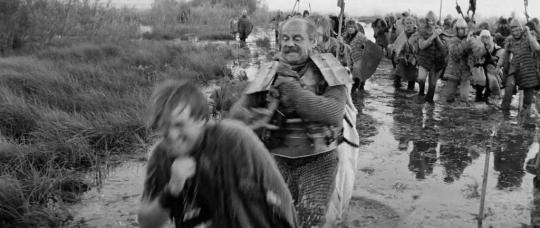
As vast and interwoven the plot of the film is, it's not what makes the experience of watching quite so transcendent. What makes this film feel like an out-of-body experience is Vláčil's use of non-linear and non-realistic techniques. Parts of the film's story are told in flashback, but without any explicit indication that this is happening. At times we see disconnected, hallucinatory images that only make sense when they are contextualised later on. One example of this is an erotic scene between Alexandra (Pavla Polášková) and a young man, who we assume to be Kristian (Vlastimil Harapes). It's only later that we discover that this is a flashback to an abortive romance between Alexandra and her brother Adam (Ivan Palúch) - a man I had initially disqualified from appearing here because Adam only has one arm in the current scenes. Revealing that it is Adam propels the story forward in traditionally linear fashion, but also causes the viewer to reassess the film's earlier scene to determine why these images are included there. These images are made further alien by their unexpected visual qualities: the sex scene takes place in a field of summer grain, but most of the film's 'present day' takes place in winter and early spring. Rather than ascribe them to an unmotivated flashback, it seems easier to read them as a poetic hallucination, and then Vláčil returns to reorganise what we had previously believed of the narrative.
As well as the narrative structure, Vláčil frequently employs long periods of silence and a seeming mismatch of cinematography, where figures are either oddly close to the camera or absurdly far away. On a deep level, it feels like nobody, even the director, has total control over what is being portrayed - like we've entered a kind of fugue state in which cinema just happens regardless of how legible its results are. Although its filming process was so long, the resulting scenes feel accidental or improvisational, culled down from a vast amount of footage.
While many of these techniques give us the experience of watching a dream of an imagined past, these techniques are also quite violent and confrontational. Even when the shots are distant or filmed in long takes, they're cut together in a jarring way, and the lack of a straightforward narrative makes it difficult on the viewer too. The activity implied in this method of editing, a complicated soundscape and opaque narrative combine to make Marketa Lazarová a film that feels very immediate and present. As Tom Gunning put it, writing for Criterion about his early encounters with the film, "an energized mobile camera and abrasive editing peers into a primitive era of human history." Just as the characters of the film are quick to anger and quick to act, the film also lacks temperance. This is a film of life and death in its most vital forms, and so it makes a certain kind of sense that Vláčil would, in defiance of the typical historical film, try and remove any layer of modern logic or reason that would prevent us from experiencing the film's events in a visceral way. This is also why the myth of the werewolf hangs so heavily over the film - invoked a few times by Kozlík's wife, and present in the appearance of his children and their uncanny survival abilities - it both defies modern logic and refers to a particularly corporeal type of monster.
Vláčil structures Marketa Lazarová with sudden intertitles that refer to the events and themes that we are about to see, in a poetic way that recalls the chapter titles of a 19th-century novel. 'On the Lot of Widows' and 'Who in the Past Brewed with Hops' provide the vantage point of someone placed about the action, narrating it to us in a distant sort of way. The music is similar: both ancient and modern, it frequently uses atonal incantations. Taken together, it feels like this story is being shouted at us from a distant time when things were more tactile. "The presence of animals and plants, the textures of stone and tree bark, of snow and marsh water," Gunning writes, "cling to us as we watch, often overriding the narrative."

The grand experience of watching this film is partly contradictory, then: this is a film that feels very modern, tells a story from the past, alludes to contemporary struggles, and when situated in Czech film history is wildly experimental. Gunning sees this film as being, in some respects, a statement about what Vláčil thought cinema could be, in those days of the 1960s where most national cinemas were experiencing their own variations on the New Wave that had developed in France. The experimental aspects of the films of Godard and Varda would be subsumed into the traditional toolbox of cinema and lose some of their vibrancy as a result - either directors would use them for blockbuster films or extend them into a new type of experimental film that was sterile and aloof.Considering this, it's worth appreciating exactly how daring Vláčil was being here: under a Communist regime, making a film about paganism, bestiality, sadism, incest, and torture. With all this darkness, Marketa Lazarová is a bright film, even funny at times. Humanity is a fallen, self-destructive thing, but there is something about this way of life, before it was layered deep underneath civilisation, reason and enlightenment, that was exciting and vibrant.
Does civilisation mean we lose something of our potential? The final narration of Marketa Lazarová tells us that these cycles of mistrust and anger are likely to repeat through the generations, but is that a price Vláčil thinks is worth paying? The urgency and difficulty of life in the distant past was inseparable from the superstitions of the time, but the urges were easier to sate, at least temporarily. The taming of these clans, like the taming of the avant-garde techniques Vláčil employs here, might have been inevitable, but this film shows that there is something valuable there nonetheless.
10 notes
·
View notes
Note
I am excited for your prompt-a-thon! Is it possible to get a continuation of that JayDick arranged marriage drabble you wrote a while ago?
Of course <3
This is the drabble in question, btw. It’s probably a good idea to read it first.
Jason had been married for two months, and he hated every minute of it.
After their shitshow of a wedding, which had ended with Dick openly expressing his disgust to Jason, they hadn’t spoken for a week. After, Jason had reluctantly begun talking to the other man again, if only because he’d noticed the servants gossiping.
“It’s important to convince them,” was all that Dick had said when Jason entered their rooms again. His face was doing that thing where he aimed at being friendly but just ended up being unreadable, at least to Jason. “I know you don’t want to be here, but…”
Jason had nodded, and that had been that. He was at the head of the House of Wayne, now, second only to his husband. There was a lot at stake here—the territorial integrity of Gotham, no less.
Also, he’d promised Bruce. That was the only reason he kept returning even when Dick drove him mad, when Jason wanted to shatter all that fine china and throw the golden statues out of the window. Bruce Wayne hadn’t done especially much to earn Jason’s loyalty, not by the end—but he had once saved Jason’s life. Gave him shelter when no-one else would.
For that, Jason would help keep his empire together.
His duties weren’t that bad once he got used to them. It wasn’t easy juggling them and his classes at the same time, so he dropped a few courses. Not like he was in any hurry to finish, now, seeing how his tuition was comprehensively taken care of. How Dick did it was beyond him. Not that he was surprised. Mr. Perfect probably looked down his nose at Jason for giving in even that little bit.
He knew Dick was still going out as Nightwing by night. How, exactly, his husband presumed he didn’t notice him leaving when they shared a bed was beyond him. Dick really must think him stupid.
He’d better not have left early tonight, though. If Dick left Jason to explain his absence at one of the most important social events of the year, there better be at least two orphanages burning.
Jason knocked on the door to Dick’s study for a second time. “Dick?”
When no answer came, he turned the doorknob, fully expecting to find the room empty.
It was not. Dick was sitting behind the desk, papers and laptop in front of him. He looked up. “Oh. Jason.”
“Hey,” Jason said, gentler than he’d meant to. Something about Dick’s posture was off—not that he cared. His next words came out in his usual rough tone: “The banquet is about to start. Why aren’t you ready yet?”
Dick blinked at him. “The banquet?” His voice was weirdly blank.
“Yes, the one with the Kyles and the—“
“…ah, yes. I… I—“
Slowly, inexorably. Dick slumped over and buried his face in his hands.
“Dick?” Jason hurried to his side. Did his husband just have a heart attack or something? Jesus, what if someone had poisoned him—
“I’m fine,” Dick said, but his shoulders were shaking, and he clearly wasn’t.
Jason stood next to him, undecided.
“Sorry, I just—I’m just not ready.“ Dick seemed to feel the need to explain himself. “There’s all this paperwork I’ve been meaning to finish, and the council meets tomorrow—Dent is going to want to talk about the social programs again, and I need to prepare because he’s wrong, but—And I have an economics paper due at noon. That I haven’t even started.”
“Dude. Breathe.”
“I’m sorry,” Dick whispered. “I’m sorry. I’m fucking this up, I’m—“
“You’re fucking tired,” Jason interrupted.
It was at least enough to get Dick out of his fugue. He looked up at Jason with red-rimmed eyes. “What do you mean?”
“I mean that you need to take a break. When was the last time you even slept through the night?”
Jason looked around. Dick had two phones, one for normal life and one for his night activities. The latter tended to be nearby but hidden—ah, there. Beneath the book on tax law. How predictable.
He handed it to Dick and told him: “Text them. Two nights.”
When Dick opened his mouth, no doubt to argue, Jason held up a warning finger: “I could blow your operation in five seconds if I wanted. No arguments.”
It was a little mean, but it worked. Dick typed, and the phone chimed confirmation less than twenty seconds later. Whoever it was on the other side told Dick to make it three nights and not to think about coming back early.
That settled, Jason put his hand on Dick’s shoulder and bodily pulled him up. The docile way Dick followed him told Jason more than enough about other man’s state of mind. Jason didn’t show just how freaked-out he was by that; he just led Dick to the bedroom and gently pushed him toward the bed.
“C’mon. I can’t promise everything will be better tomorrow morning, but sleep sure as fuck won’t hurt.”
Dick took a few steps toward the bed before turning around. “Why’re you doing this?”
Good question. “Cause someone has to. If you keep going like that, you’re gonna work yourself into an early grave, and I’m gonna be the one under suspicion for murder. Again.”
Dick looked skeptical. As he might.
Jason just pointedly leaned back against the doorframe, though. “I’m gonna keep standing here until you’re settled, just so you know.”
Dick grimaced, but he did get into the bed. As Jason had suspected, it didn’t take the longer man long to forget his presence; Dick’s exhaustion caught up with him so rapidly, he fell asleep with Jason still watching.
Curled up around his pillow like that, Dick no longer looked like Golden Boy, the perfect heir to a powerful house, a respected vigilante, a top student. He looked like a scared young man who had lost his father less than six months ago.
Jesus. Had Dick even had time to grieve?
Jason closed the door and took a deep breath. Then went to give his instructions to the servants. Master Dick was sick—just the flu, but his loving husband was worried. All events canceled and no disturbances. If they could send up some food, that would be most appreciated, though he would come make something himself if that was too much work.
For the first time, he saw an approving smile on the head butler’s face.
Then he returned to the study.
Okay. What this city needed—what it was lacking—was a strategy. Jason had only seen fragments of what it took to rule. He suspected Dick was in the same boat: too deep in some areas, too superficial in others. So that would need to change.
Tonight, he would read up on Dick’s work, finish his paperwork for him. (Maybe even that paper, though he would e-mail the prof about an extension first.) Tomorrow, he and Dick would sit down and talk. There had to be a schedule, a division of duty that worked for both of them. Something that allowed them to juggle their duties and maybe—just maybe—do more than just survive. All they had to do was work together and figure it out.
To his surprise, Jason was actually looking forward to it.
(I’m taking prompts until the end of the year.)
68 notes
·
View notes
Text
Single Mothers Will Probably Cry During Every Episode Of Queen’s Gambit - Episode 2
Episode 1, which I wrote about yesterday, was called Openings. It walks the viewer through Beth’s childhood trauma. The violent car crash she survives, and her entrance at an Orphanage where she discovers tranquilizers and the Chess Board.
In the first episode, Beth connects with her mother through fashion, which manifests in embroidery, that her young mind associates with the chessboard.
Yes, in the first episode, we see young Beth using tranquilizers to cope with the pain her mother’s passing has caused her. But Beth didn’t learn substance abuse from her mother. In fact, we never see her mother using mind altering substances through out the series. That is something Beth learns from mainstream society, symbolized by the orphanage, and later the Wheatley household.
Lesson 2 : Dissociate. Sometimes.
At the beginning of Episode 2, we watch as Beth gets adopted by the Wheatleys. The viewer is uneasy during the first couple of minutes. We observe nervously as Mr Wheatley stares at her in the mirror of the car. Afraid that he might try to sexually assault her once she is in his home. We relax as we watch the car park in front of a nice house in the suburbs of Lexington. For a glorious minute, we think that Beth is saved. She has a beautiful roof over her head, a mother and a father, a new high school.
The Wheatleys have the perfect house in the suburbs, a richly decorated interior, a piano. But quickly Beth comes to observe that Mr Wheatley detests being around his wife, that he disapears ever so frequently to other cities. And that most of all, he exercises a power over Alma that seems stronger than the laws of Nature.
We see that whenever Alma begins to discuss a topic he is not interested in, he clears his throat and she immediately turns to more unsignificant, meaningless chit chat. As he disapears into the black hole of his “business trips”, we understand that adopting Beth was merely an exit strategy for Mr Wheatley. He wants to give his wife a companion before checking out. He wants to leave her and can’t stand the marriage, but he doesn’t want to feel guilty about it.
We discover that Alma has an addiction to alcohol and cigarettes. That her doctor prescribes the same tranquilizers that Beth used in the orphanage. And that she washes away her brain with these substances day in and day out. it is difficult to watch Alma stare at the television as she works through a six pack, or lay in bed all day with a terrible hangover, only to blame it on a “virus”.
In this episode, which might as well have been called the “Feminine Mystique” we explore the topic of women’s existential crisis in the 50s and the advent of second wave feminism. Alma discovers that adopting Beth does not solve all of her problems, that she still feels miserable. That “the problem with no name” as Betty Friedan called it, is still very much present in her life. So what is it? Why does she need to drink? What is she trying to numb?
It is no secret that during the Second War World, women were called upon by the Western governments to join the workforce.

They worked in factories, offices, telephone centers and kept the economy going as their husbands, sons and brothers were sent to fight Hitler’s Germany. During this period; women proved that they could get the job done. And when their husbands came back from the front, a massive intellectual movement was launched. The purpose of this new mouvement was to send women back home. Betty Friedan, (who is clearly Beth’s namesake) theorized this in her 1963 best seller : the Feminine Mystique.

She explains how College Professors, Journalists and General Practicians all flocked together to create a new narrative. In the 15 years between 1945 and 1960 the mouvement was so strong that American women were getting married at younger ages than in the third world. They were getting pregnant before high school graduation. And the few that went to college dropped out as soon as they could get a ring on their finger.
A smear campaign was launched to discredit the “feminists” that had “gone too far”. They were trying to “be men” and they had only managed to become bitter, ugly, spinsters. This message was repeated over and over again, in the magazines and TV shows. Women were caged in their homes, bored to death and miserable. They went to therapy where they were diagnosed with “penis envy” and sent home with tranquilizers.
To paraphrase the great Nigerian feminist novelist Chimamanda Bgozi Adichie, women were being raised to aspire to marriage which is all fine and dandy until they realized that men were not being raised to aspire to marriage. Not at all. They were raised to pursue exciting adventures, to challenge their great minds, to adopt a hobby and become the best at it. They came home to depressed wives, that had little to contribute to the partnership. The men, like Mr Wheatley, were uncomfortable, it was unbearable for them to be married to such souless creatures.
So the business trip was invented!
What is remarquable about Betty’s account of what it is to be an intellectual woman in the U.S.A. during this period; is that she explains that the previous generation was the exact opposite of this. The mothers of the Bettys were the Alices. Mathematicians. College educated women. They had fought in what is now dubbed the first wave of feminism. Obtained the right to go to school, to have a bank account, to vote. They were the sufragettes. They wore white and relayed each other on the picket fence. They had fought very hard to obtain the right to exit the home, to stop belonging to men, to own property. And now their own daughters were being brain washed to abandon all of these rights and cage themselves. It was devastating to witness such a thing. I believe Alice’s character is named after Alice Paul who obtained the right to vote in 1920.
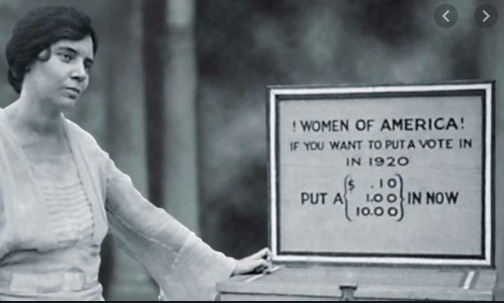
The first time Beth sees Mr and Mrs Wheatley argue, she sees the way he humiliates his wife. They are seen arguing in the driveway. He is leaving, he holds his briefcase and is about to enter the vehicle. In a couple of sentences, he tells her she’s a terrible driver, that she needs exercise, and belittles her new companion. In his own words: “She doesn’t seem like she has a whole lot to say”. Once Mr Wheatley leaves, Mrs Wheatley takes to the piano and plays a melancholic song beautifully. Beth comes down the stairs and watches. Mrs Wheatley pretends like she isn’t sad her husband left, like she doesn’t sense that he is in fact leaving her. That she doesn’t know that the business trip is a lie. She tells Beth “Please stop gawking you’re making me nervous”. In this scene, when Mrs Wheatley sees Beth coming down from the stairs she says in a fake, sweet voice: “You’re up early, must be all of the excitement due to your first day of school”.
When she does this, Mrs Whealtey is actually engaging in something called “The prevention of real talk”. Marco Rogers, who goes by the handle @polotek on Twitter theorized this in a tweet in January 26th.
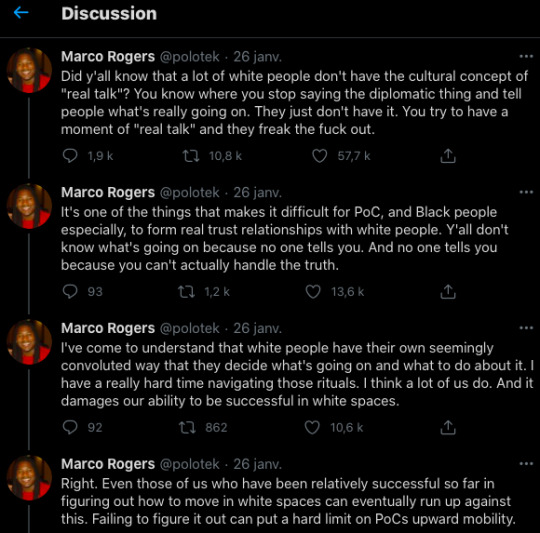
He continues
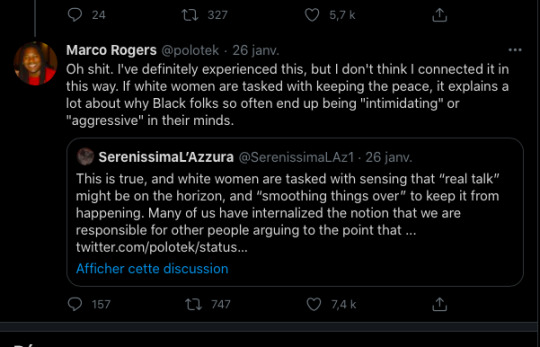
Twitter user @SerenissimaLAz1 chimed in and confirmed that white women were tasked with the Prevention of Real Talk. We see Alma do this several times during the episode. Every time she senses that a conflict might occur, she changes the topic of the conversation; adopts a fake sweet voice and steers the energy away from the issue at stake.
Instead of being honest with Beth about the state of her marriage, her doubts, she makes up a little story in her head. Nothing is wrong. Beth is excited for school. Beth then asks her head on : Where is Mr Wheatley? And Mrs Wheatley tells her that he must travel once more. She makes a sentence that seems to say that she believes him. And adds a snark comment at the end “As he likes to remind me, he puts the roof over our head”.
Thus, Mrs Wheatley summarizes the second wave of feminism. Women in the 50s could not win a single argument with their partners and had to resign every fight because in the end they weren’t the breadwinners. The were “just” the homemakers.
Beth then tells this new mother of hers that she plays the piano beautifully and Mrs Wheatley tells us that she always dreamed of joining the orchestra, but that she had stage fright. Then she got pregnant.
Beth looks out of the window at the end of the episode. She’s started menstruating. She is atracted to some of her opponents in the chess tournament. She has learned that women that live inside of suburban houses are miserable. As she looks out in the window, and into the quiet driveway, she sees Alice’s face. Alice tells her “Close your eyes”.
These were Alice’s last words before she crashed into the truck, as we have explained. But here, they take on a new meaning. What Alice is telling Beth, is that in life, she will sometimes have to learn to dissociate from the situations she finds herself in.
According to the Better Health Channel:
Dissociation is a mental process of disconnecting from one’s thoughts, feelings, memories or sense of identity.
The dissociative disorders that need professional treatment include dissociative amnesia, dissociative fugue, depersonalisation disorder and dissociative identity disorder.
Most mental health professionals believe that the underlying cause of dissociative disorders is chronic trauma in childhood.
The episode presents the dissociative process that single mothers follow to cope with the realities of patriarchy. And how, when they do this, they make their chldren, espeacially their daughters, feel anxious. It is scary to think that the female adults are telling you to “close your eyes”. What is it that they don’t want you to see? And how long can they hide it from you? Mrs Wheatley tries to conceal her pain, use a sweet voice and stuff herself with tranquilizers. Alice is brutally honest, tragically self aware. Alice decides to live in a trailer, removed from society. She does not lie to her daughter. She lives in her own truth. But still, she says : Close your eyes.
To win the tournament, her very first tournament, Beth uses the tranquilizers she stole from Mrs Wheatley. She can’t stand her own emotions, they are too painful. She is too afraid. She remembers the life lessons from Mrs Wheatley (Drink your pain away; be numb, pretend everything is fine, use a sweet voice) and Alice’s lessons (Close your eyes). One could even argue she uses the lessons she learned at the Orphanage, because we see Beth use a snarky comment when she beats Beltik about how he should’ve been on time.
To beat Beltik, Beth blocked “it” out. In the terms of a psychiatrist : she dissociated. Pretended that she wasn’t under pressure, that no one was watching her, that she wasn’t losing. She ate the pill and mushed over her brain. Then she looked up at the ceiling and saw the pawns, and did what she learned to do at the orphanage. Visualize the board, move the pawns, envision every scenario, find the best move.
Beth rushed to the bathroom and takes the pill. She looks up at the ceiling and there is the chessboard. Finally she can focus on the board, and work her way out of the pickle she’s in. Win the tournament.
She comes back from the bathroom with a weird, relaxed look in her eyes. And she wins.
Steady cold. And with the money from the tournament she buys more dresses.
1 note
·
View note
Text
14x16: Don’t Go in the Woods
Then:
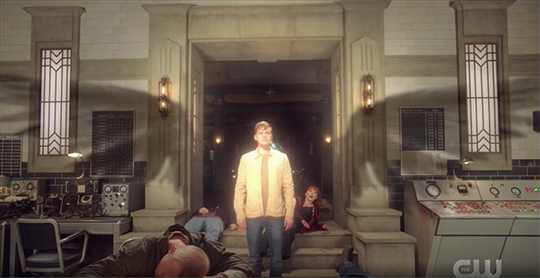
Jack is FINE.
Now:
In a deserted rest stop at a park, two teens are enjoying some alone time in the back seat of their car. The girlfriend, Barbara, hears a noise that doesn’t seem like it came from nature. The boyfriend, Thomas, shrugs her off at first but then agrees to go check out the noise. He’s confronted by his sheriff father just as he opens the door. AWKWARD.
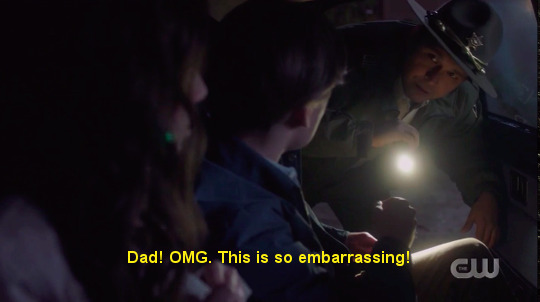
They fight about what he’s up to and Barbara heads to the bathrooms to give them some space. The bathroom is …the picture of perfection. She heads to the least disgusting stall. Once inside, she hears noises and sees a shadow in the room, and then a creepy monster hand curl itself around the top of the stall door.

Cue the screaming! Sheriff Dad rushes in to a now empty bathroom. He runs into the forest, briefly sees a Bigfoot-like creature in the shadows of the trees. Thomas cries out and the sheriff finds his son bereft over the dead body of Barbara. (Honestly, I thought we were only going to kill off white men for the rest of this show. This seems regressive.)
At the bunker, Sam is sitting alone in the dark kitchen. He’s clearly not doing well by pouring himself into finding another case to work. Dean wanders in and I enter a fugue state where I can’t remember what happens for the next couple of minutes. (I actually agree with this post 100%. Dean knows Sam’s state of mind. He’s always willing to fit that role that will help Sam feel better, more confident, and distract him with antics they both know aren’t real.)
Anyway, Sam has a case of missing people through the years in Iowa. Dean agrees, and Sam says he’ll grab Cas. Dean admits that Cas left earlier in the morning.

Dean also thinks that Jack should sit out hunting for now. He’s a bit of a wild card and it might be better to keep him close to home for a bit.
They find Jack in the library reading about zombies. Dean tasks him with restocking the bunker with beer and beer. (Um, I guess those driving lessons paid off. Now Jack can drive to the store alone and buy liquor he’s totally old enough to buy. Good parenting, Dean!)
Once in Iowa, at the sheriff’s station, the brothers are told the murder was actually a coyote attack, nothing more.
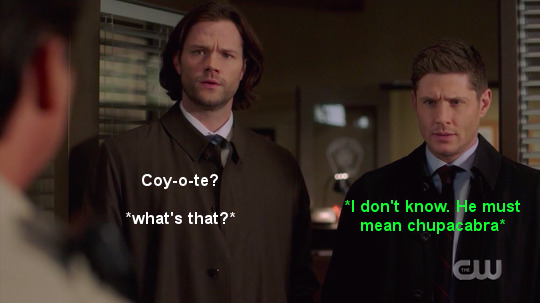
They still insist on viewing the body. They see the claw marks, and the burns around them, and know this isn’t a coyote attack.
Jack, meanwhile, is on his shopping excursion in Lebanon. It pains me how friggin’ cute he is. He’s awkwardly waiting for the store to reopen when Eliot, Max, and Stacy arrive. Eliot is garbed up in a cute brown and plaid jacket (such a hunter in training!) and watching videos of the Ghostfacers (what a blast from the past!) They notice “Bambi” just chillin and talk with him.

Eliot wants to know if Sam and Dean are ghost hunting, and Jack asks, “What’s a ghost?”, followed instantly with, “I have to go.” Boy, that line delivery was so perfect. In any event, Jack’s making friends, guys!
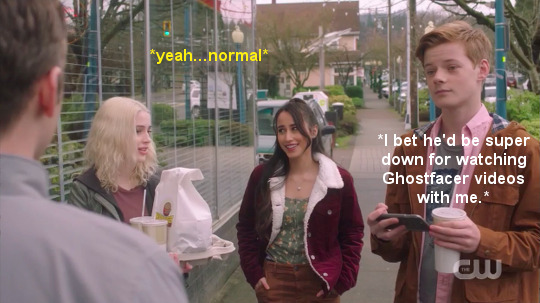
Jack and Eliot bond over reading about monsters. I just want to squish them, they’re so cute.
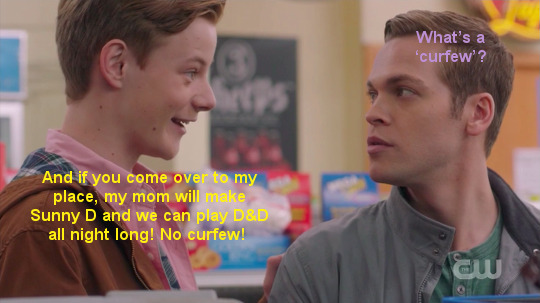
Also, how can Alex Calvert seem so young? Jesus, he does a good job playing baby Jack. We learn that the bunker has movie night every Tuesday, and that Dean really likes The Lost Boys. The kids learn that Jack is two, er, um, twenty-two. Whew, good save there, buddy! They still invite him to the abandoned house to hang out. Then they ask for ID to buy the beer (and I’m all like? Hello, you now have someone old enough to buy beer for you? What kind of narc kids are you?) Jack agrees to hang with his new friends.
At the sheriff’s office, Sam and Dean get free reign of the joint after hours (my how things have changed for them.) Sam thinks they’re dealing with a Kohonta, a local and ancient forest monster (in the great Northwest forests of Iowa —the X-Files often explored these forests as well.)
At the park a couple are hiking, in the dark.
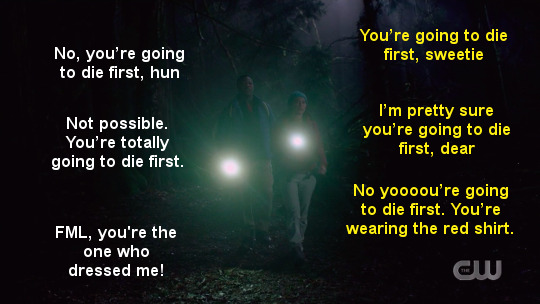
They hear a weird whistling, and then see a figure in the trees. They call out to him. It’s the forest monster! All twigs and stomach acid! (And once more not a dead white guy in sight. Sigh. —I don’t know what I’m focused on this this week?)
At the crime scene, Dean and Sam interview the other hiker. She gives them a location on where to look. The sheriff arrives and wants to shut down operations. Dean insists that because they’re the feds, they can still search the forest. He tells them they can’t, and the brothers are totally going to follow those orders.
Jack shows up at the house laden with books from the bunker’s library. Jack! Did you fill out a borrowing slip for those? Jack wanders the room with his signature awkwardness. In the space of minutes, he reveals that he likes Dean’s music, has never heard of the SATs, and that demons are made of smoke and totally real.
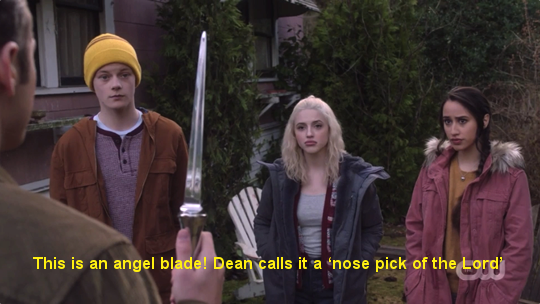
The Local Teens ™ are intrigued by Jack’s purported hunting prowess and, encouraged, he brings them outside to demonstrate an angel blade. It goes poorly at first… Poor Jack. It’s hard to impress older kids.
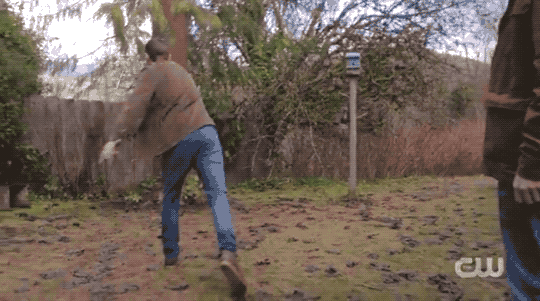
In the woods, Sam and Dean hunt the kohunta. As they’re stalking through the woods, the Sheriff sneaks up behind Dean with his shotgun and orders them to drop their weapons. Yikes, but also mad props to the Sheriff for sneaking up on Dean. He doesn’t get the drop on them for long, though.
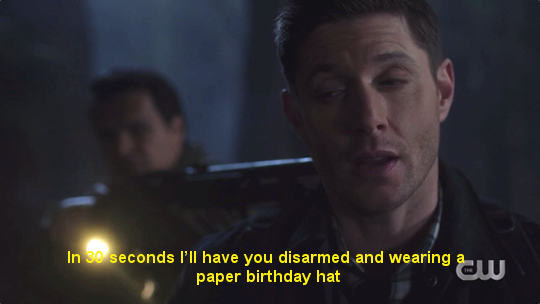
Cut to night… Jack’s apparently been trying to throw his blade all afternoon and the Local Teens ™ are bored. They goad Jack into defending his skills and he activates his newly restored nephilim power to finally hit the target. Hooray! Cool! Also, whatever.
Until…Jack uses his power to mind-mojo the blade back through the air and into his hand. Jack’s ecstatic about this, Eliot’s excited, and the two girls (who are clearly more sensible) are majorly weirded out. (Max is intrigued, at least.) Jack, encouraged by the sudden interest, levitates the blade in the air and then begins to swirl it around. It zips around in ever-increasing complex patterns. “I can control it,” Jack chirps while whipping the blade feet away from the teens, who are getting freaked out. Stacy tries to run and Jack’s blade cuts right into her, buried up to the hilt. Jack pulls out the blade and light glows from his hand as he tries to heal her. We’re left to wonder for just a moment if Jack failed…but Stacy sits up. She’s healed!
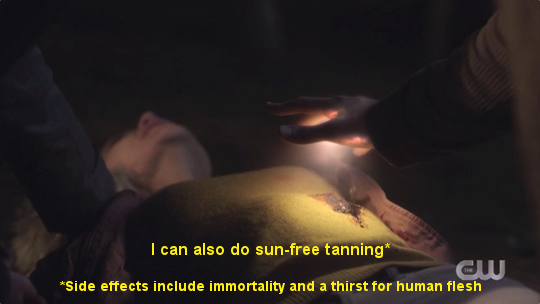
Jack moves towards them, encouraged by being able to heal Stacy and thinking he’s back in the teens’ good graces. They turn him away and Eliot orders Jack to stay away.
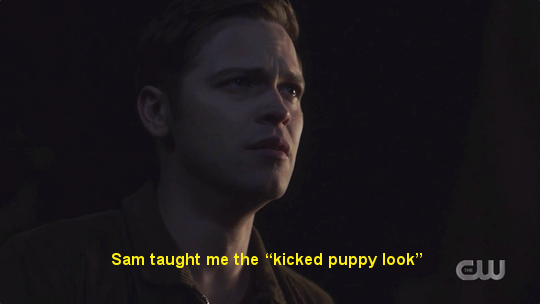
Dean and Sam talk to the Sheriff about the kohunta and we get a quick info dump on the MoTW. It’s an old tribal legend about the Parker family - some of the first white settlers in the area. One winter was particularly hard and the boy went crazy and ate the rest of the family. He developed a taste for people and started going after the people of the tribe. Instead of killing the crazed cannibal, they transformed him into the kohunta - a starving creature cursed to roam the woods and either eat people or slowly die of starvation. Legends being legends, this was forgotten and the woods they trapped him in were eventually invaded by interlopers a.k.a. tasty snacks.
Phew. Okay. Plot continues…. Sam and Dean totes kill monsters and they’re ready to help the Sheriff. The Sheriff asks them about going to YouTube to tell the world how to fight monsters but Sam’s against it.
The Sheriff’s son, Tom, interrupts their narrative wheel-spinning by calling and telling his father that he’s going after his girlfriend’s killer himself. The Winchesters and the Sheriff race to save him, silver blades at the ready (because it turns out that is what will kill them).
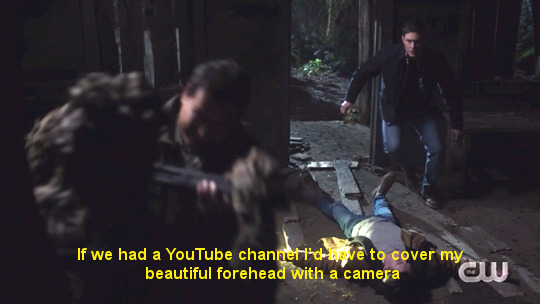
Tom reaches an old cabin, stalked by the monster, only to be attacked! It’s not looking good for Tom, who is about a second away from getting a giant acid lugey to the face. The Sheriff and Winchesters break in and they fight off the kohunta. One punchy kicky fight scene later and the monster gets a knife to the heart and dies. (Query: if this beast was around for long enough that the tribe forgot it existed, then how does cloth survive on its back? Magical curse blah blah, I guess.)
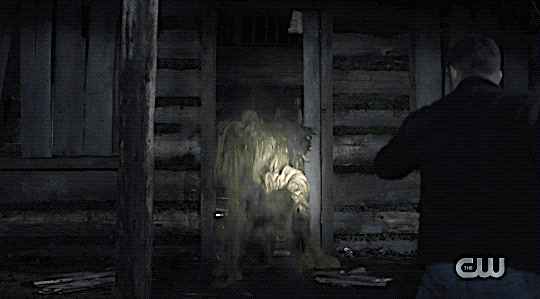
Tom’s alive. The Sheriff’s alive! Everybody wins. Sam and the Sheriff discuss the truth of the monster. Sam counsels him to tell the truth to his son; it’s the right thing to do.

Later, in the Impala of Feelings, Dean asks why Sam wanted to tell the truth. Lying’s the best way out of anything. Sam reminds him of lying to Jack…and all the times they lied to their dad about being “fine just to make him happy.”
Dean and Sam arrive back at the bunker. Jack got all the groceries except for the beer. (He only has fake IDs!) The Winchesters tell him they’re worried about Jack’s powers and they want him to not use them for a while. They’re telling him how they feel because they care. Feelings!
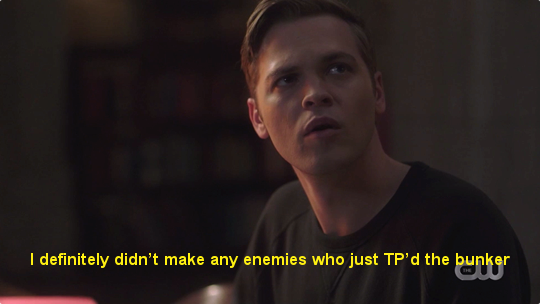
Jack mulls this over, and then fails to tell them about how terribly his powers just went wrong. Yeah. This is great. (Side note: he has learned one thing from Local Teens ™: subterfuge.)
Let’s Have a Quote Saber Fight!
Dean says that any music made after 1979 sucks ass
Well, there are standard hand to hand moves…like a light saber
Are you like a Jedi or something?
Whoa, that’s like full on Raiders!
Want to read more? Check out our Recap Archive!
#spn spoilers#spn recap#spn 14x16#don't go in the woods#dean winchester#sam winchester#jack kline#stacy and max and eliot#supernatural season 14
74 notes
·
View notes